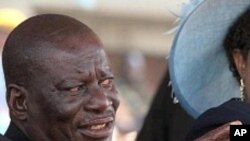The much-awaited ruling of an inquest into last year’s mysterious death of retired army general Solomon Mujuru in a fire at his Beatrice farm, is finally out with the coroner concluding the late ZANU-PF kingmaker died as a result of smoke inhalation.
In his findings presented to Attorney General Johannes Tomana, but still to be made public, coroner Walter Chikwanha said Mujuru died after inhaling fumes of smoke. He said he found no evidence suggesting that Zimbabwe’s most decorated army general could have been murdered.
The Mujuru family lawyer, advocate Thakor Kewada, told Voice of America that the deceased’s widow, Vice President Joice Mujuru, was given a copy of the findings also on Thursday by Tomana.
Kewada confirmed the coroner’s verdict.
“The magistrate has run through all the witnesses and the evidences that have been given by each one and the magistrate has said that the pathologist has said that the death was caused through carbonization, and that there is no evidence to show how the fire started and as a result of that we are still no better off than when we started off at the beginning,” said Kewada.
The attorney said he was unhappy that the family’s preferred pathologist, Dr. Reggie Perumel of South Africa, was denied a chance to examine the remains of the deceased.
“We feel that having read the pathologist’s report, before the pathologist gave evidence, that it was necessary for us to call another pathologist and we did call this pathologist but the magistrate said he wanted to hear this particular Cuban pathologist first before he makes up his mind as to whether we can call the pathologist we wanted to call or not.”
In light of this, Kewada said he would pursue the exhumation of Mujuru’s remains from the national shrine to pave way for the re-examination of those remains by an independent pathologist.
“We certainly would like to see authority being given for us to exhume the body to have it re-examined by our pathologist.”
He said the Mujuru family and several Zimbabweans are not satisfied with magistrate Chikwanha’s findings.
“I think it has left doubts in people’s minds but people had those doubts when the inquest was going on. I don’t think this verdict has brought closure to it”.
Kewada said he will not rest until he manages to have Mujuru’s remains exhumed for re-examination. He says he will seek the Home Affairs ministers' authority to exhume the remains as is required by the law.
But many questions still remain even after the lengthy hearing. Many are still asking what or who caused the fire that killed the country’s most decorated soldier.
Analyst Rejoice Ngwenya said the coroner’s ruling is not surprising, given the highly political nature of the case.
“Independent witnesses claimed that a lot of evidence was tampered with so I don’t think Zimbabweans are going to be roundly surprised with this kind of verdict, but really there are more questions than answers that have been raised by this very shoddy investigation of this case.”
Ngwenya said the Mujuru family have the right to pursue the matter further but, he adds chances of getting to the truth are very slim.
“It was not a good idea for the Mujuru family to allow the late general to be buried without conclusive evidence on the cause of death," said Ngwenya. "So it is unlikely that this highly politically charged case can result in any exhumation.”
The general, who was an influential figure in ZANU-PF, died at his farmhouse in Beatrice, south of Harare in August. His death has deepened the divide within the former ruling party where his wife, Joice, is said to lead a faction many say is a moderate wing - an organization that helped bring political independence to Zimbabwe in 1980.
Speculation is rife that Mujuru may have been eliminated by his rivals in his own party.
Lawyer Lovemore Madhuku said no-one knows what really caused the death of the general. He said if Mujuru was murdered then the "murderers must be very sophisticated as there is no clear indication of what happened.
Madhuku said it’s not wise or advisable for the Mujuru family to exhume the general’s body, which was burnt beyond recognition in the inferno.
“It’s not something that must be encouraged. They have to find other ways of coping with the death of the general because there won’t be any conclusive scientific position as to what caused the death” said Madhuku.
“When I said they should look at other ways they should just go to their own cultural methods of trying to ascertain the cause of death or to simply come to terms with the fact that this was a mysterious death.”





